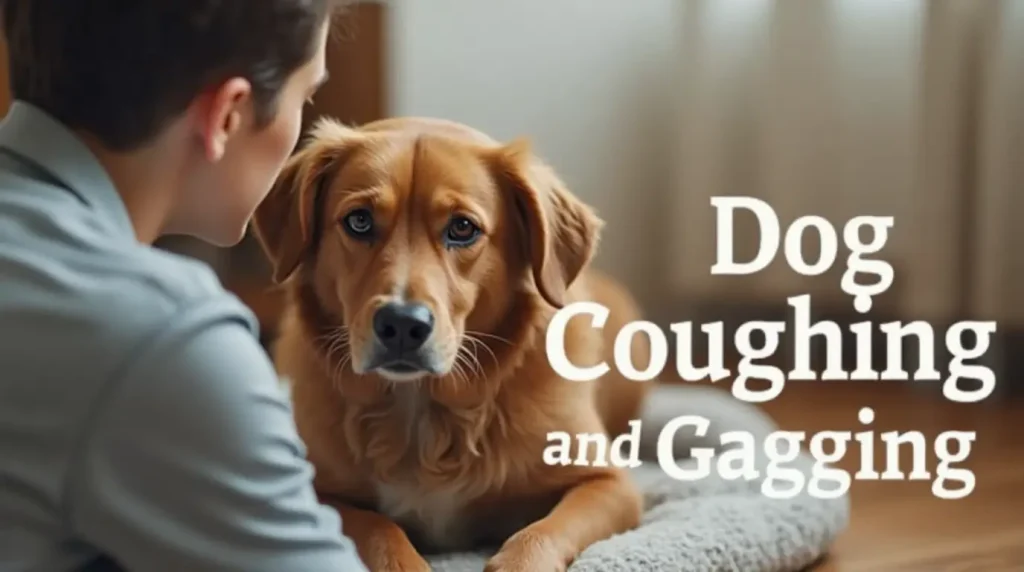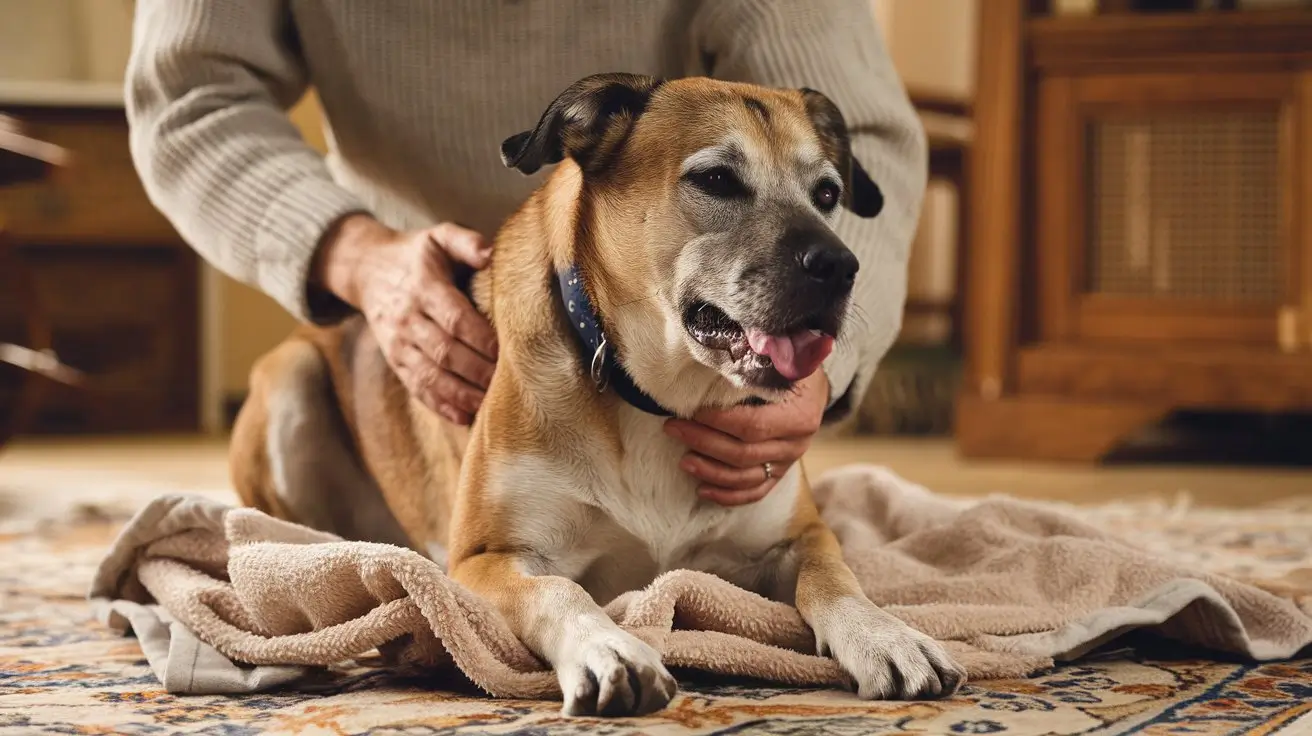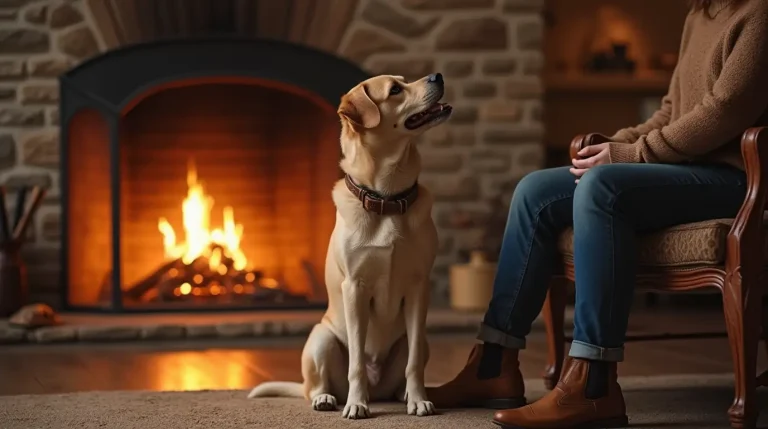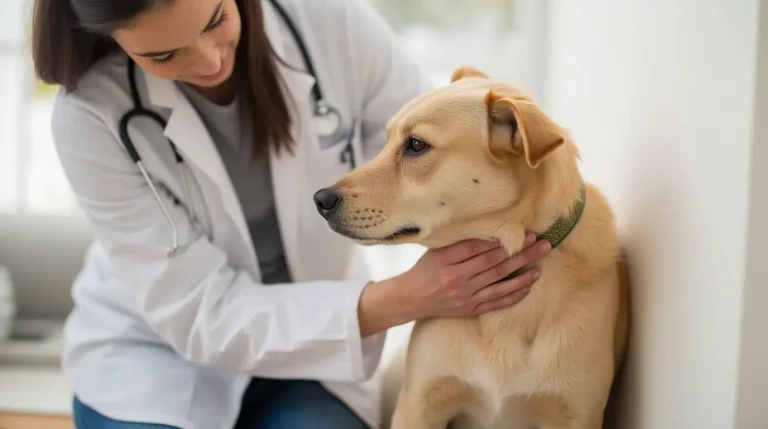Dog coughing and gagging can be a distressing experience for both pets and their owners. These symptoms can leave you worried about your furry friend’s health, whether it’s sudden coughing or persistent gagging. While occasional coughing is normal for dogs, frequent or severe episodes may signal an underlying issue that needs attention. Dog coughing and gagging can be alarming for pet owners, but understanding the causes and solutions can help you provide relief for your furry friend.
In this post, we’ll explore the common causes of dog coughing and gagging, discuss when it’s time to see a vet and share vet-approved tips to help your dog feel better. By the end, you’ll have a clearer understanding of what might be troubling your pup and how to take the right steps toward their well-being
Table of Contents
Common Causes of Dog Coughing and Gagging
Dog coughing and gagging can stem from a variety of causes, ranging from mild irritations to serious health conditions. Understanding these common reasons can help you identify what might be troubling your dog and take appropriate action. Below, we’ll explore the most frequent causes, their symptoms, and what you need to know about each.
Kennel Cough
Kennel cough, also known as infectious tracheobronchitis, is one of the most common causes of coughing and gagging in dogs. It’s caused by the Bordetella bronchiseptica bacteria, often in combination with viruses like parainfluenza.
- Symptoms: A persistent, dry, hacking cough that often sounds like your dog is trying to clear their throat. Gagging or retching may follow the coughing fits.
- Contagiousness: Kennel cough is highly contagious and spreads quickly in places where dogs congregate, such as boarding facilities, dog parks, or grooming salons.
- Treatment: While mild cases often resolve on their own, severe cases may require antibiotics or cough suppressants prescribed by a vet.
Tracheal Collapse
Tracheal collapse is a condition commonly seen in small breeds like Chihuahuas, Pomeranians, and Yorkshire Terriers. It occurs when the cartilage rings supporting the trachea weaken, causing the airway to flatten.
- Symptoms: A distinctive honking cough, often accompanied by gagging or difficulty breathing. Symptoms may worsen during exercise, excitement, or in hot weather.
- Triggers: Pulling on a collar, exposure to irritants like smoke, or obesity can exacerbate the condition.
- Management: Treatment may include weight management, cough suppressants, or, in severe cases, surgical intervention.
Foreign Object Ingestion
Dogs are naturally curious and may accidentally swallow objects like toys, bones, or even grass. These foreign objects can become lodged in their throat or airways, leading to coughing and gagging.
- Symptoms: Sudden coughing, gagging, or retching, often accompanied by pawing at the mouth or drooling. In severe cases, your dog may struggle to breathe.
- Risks: If not addressed promptly, foreign objects can cause choking, throat irritation, or even damage to the digestive tract.
- Action: If you suspect your dog has swallowed something, seek veterinary care immediately. X-rays or endoscopy may be needed to locate and remove the object.
Heart Disease or Heartworm
Heart-related issues, such as congestive heart failure or heartworm disease, can also lead to coughing and gagging in dogs.
- Heart Disease: In older dogs, an enlarged heart can press on the airways, causing a soft, persistent cough, especially at night or after lying down.
- Heartworm Disease: Spread by mosquitoes, heartworms can damage the heart and lungs, leading to coughing, gagging, and lethargy.
- Diagnosis and Treatment: Both conditions require veterinary diagnosis through imaging or blood tests. Treatment may include medications, lifestyle changes, or, in the case of heartworm, specialized therapy.
Allergies or Respiratory Infections
Just like humans, dogs can suffer from allergies or respiratory infections that cause coughing and gagging.
- Allergies: Environmental allergens like pollen, dust, or mold can irritate your dog’s throat and airways, leading to coughing, sneezing, and gagging. Food allergies may also contribute.
- Respiratory Infections: Conditions like canine influenza or pneumonia can cause persistent coughing, gagging, and a runny nose. Dogs with pneumonia may also exhibit fever, lethargy, and difficulty breathing.
- Management: Treatment depends on the cause. Allergies may require antihistamines or steroids, while infections often need antibiotics or antiviral medications.
When to See a Vet for Dog Coughing and Gagging
While occasional coughing or gagging may not always be a cause for concern, there are certain situations where professional veterinary attention is necessary. Knowing when to seek help can make a significant difference in your dog’s health and well-being. Below, we’ll break down the key signs that indicate it’s time to consult a vet.
Persistent or Severe Symptoms
If your dog’s coughing or gagging persists for more than a few days or seems to be getting worse, it’s time to schedule a vet visit.
- Prolonged Coughing: A cough that lasts longer than 48-72 hours, especially if it’s frequent or intense, could indicate an underlying issue like kennel cough, tracheal collapse, or even heart disease.
- Severe Gagging: If your dog is gagging repeatedly or seems unable to stop, it could signal a more serious problem, such as a foreign object stuck in their throat or a respiratory infection.
- Impact on Daily Life: If the coughing or gagging interferes with your dog’s ability to eat, sleep, or play, don’t wait seek veterinary care.
Additional Concerning Signs
Sometimes, coughing and gagging are accompanied by other symptoms that point to a more serious condition. Keep an eye out for these red flags:
- Lethargy: If your dog seems unusually tired, weak, or uninterested in activities they normally enjoy, it could indicate an infection, heart problem, or other illness.
- Loss of Appetite: Refusing to eat or drink is a sign that something is wrong, especially if paired with coughing or gagging.
- Vomiting: Frequent vomiting, especially if it contains blood or foreign objects, requires immediate attention.
- Difficulty Breathing: Labored breathing, wheezing, or rapid breaths are serious signs that your dog may be struggling to get enough oxygen.
- Fever: A warm nose, shivering, or other signs of fever can indicate an infection or inflammation.
- Nasal Discharge or Runny Eyes: These symptoms, along with coughing, may suggest a respiratory infection or allergies.
If you notice any of these signs alongside coughing or gagging, contact your vet as soon as possible.
Emergency Situations
In some cases, coughing and gagging can signal a life-threatening emergency that requires immediate veterinary intervention. Here are the scenarios where you should act fast:
- Choking: If your dog is pawing at their mouth, drooling excessively, or unable to breathe, they may be choking on a foreign object. Perform the Heimlich maneuver for dogs if you know how, and rush to the nearest vet.
- Blue Gums or Tongue: A bluish tint to the gums or tongue is a sign of oxygen deprivation and requires urgent care.
- Collapse or Unresponsiveness: If your dog collapses, becomes unresponsive, or seems disoriented, seek emergency veterinary care immediately.
- Severe Coughing Fits: If your dog is coughing uncontrollably or seems to be in distress, don’t wait—head to the vet right away.
- Coughing Up Blood: Blood in your dog’s cough or vomit is a serious sign that could indicate internal injury, infection, or other critical conditions.
Dog Vomiting White Foam: Causes, Treatment, and When to Worry
What to Do Before Visiting the Vet
If you’re unsure whether your dog’s symptoms warrant a vet visit, it’s always better to err on the side of caution. Here are a few steps you can take before heading to the vet:
- Monitor Symptoms: Keep track of how often your dog coughs or gags, and note any additional symptoms.
- Record Videos: If possible, take a video of your dog’s coughing or gagging episodes to show the vet.
- Check for Obstructions: Gently open your dog’s mouth to see if you can spot any foreign objects (only do this if it’s safe and your dog is calm).
- Keep Your Dog Calm: Reduce physical activity and keep your dog in a quiet, stress-free environment to prevent worsening symptoms.
Vet-Approved Tips for Relief
If your dog is coughing or gagging, there are several steps you can take at home to provide relief and make them more comfortable. While these tips can help alleviate mild symptoms, it’s important to remember that they are not a substitute for professional veterinary care, especially if your dog’s condition is severe or persistent. Here are some vet-approved strategies to help your furry friend feel better:
Keep Your Dog Hydrated
Hydration plays a key role in soothing your dog’s throat and reducing irritation caused by coughing or gagging.
- Why It Helps: Water helps thin mucus and keeps the throat moist, which can ease coughing fits and make it easier for your dog to breathe.
- How to Do It:
- Ensure your dog has access to fresh, clean water at all times.
- Encourage drinking by adding a splash of low-sodium chicken broth to their water bowl.
- Offer ice cubes as a fun and hydrating treat, especially if your dog is reluctant to drink.
Use a Humidifier
Dry air can worsen respiratory discomfort and irritate your dog’s throat. A humidifier can help add moisture to the air, making it easier for your dog to breathe.
- Why It Helps: Moist air soothes irritated airways and can reduce coughing, especially in dry climates or during winter months.
- How to Do It:
- Place a humidifier in the room where your dog spends most of their time.
- Use a cool-mist humidifier to avoid any risk of burns.
- Clean the humidifier regularly to prevent mold or bacteria buildup.
Honey for Soothing the Throat
Honey is a natural remedy that can help calm your dog’s cough and soothe their throat. However, it’s important to use it cautiously and only with your vet’s approval.
- Why It Helps: Honey has antibacterial properties and acts as a natural cough suppressant. It can also coat the throat, reducing irritation.
- How to Do It:
- Give your dog a small amount of raw, unpasteurized honey (about ½ to 1 teaspoon, depending on their size).
- Administer it directly or mix it with a little warm water.
- Note: Avoid giving honey to puppies under one-year-old or dogs with diabetes, as it can be harmful.
Avoid Irritants
Environmental irritants like smoke, dust, or strong chemicals can trigger or worsen coughing and gagging in dogs.
- Why It Helps: Reducing exposure to irritants can prevent further irritation to your dog’s respiratory system.
- How to Do It:
- Keep your dog away from cigarette smoke, incense, or strong perfumes.
- Avoid using harsh cleaning products or aerosols near your dog.
- Limit outdoor activities on days with poor air quality or high pollen counts.
- Vacuum and dust your home regularly to reduce allergens.
Follow Vet-Recommended Treatments
If your vet has diagnosed an underlying condition causing your dog’s coughing or gagging, it’s crucial to follow their prescribed treatment plan.
- Why It Helps: Medications like cough suppressants, antibiotics, or anti-inflammatories are tailored to address the specific cause of your dog’s symptoms.
- How to Do It:
- Administer all medications as directed by your vet, even if your dog seems to be improving.
- Never give your dog over-the-counter medications without consulting your vet first, as some can be toxic to dogs.
- Schedule follow-up appointments to monitor your dog’s progress and adjust treatment if needed.

Additional Tips for Comfort
- Elevate Food and Water Bowls: For dogs with tracheal collapse or respiratory issues, raising their bowls can make eating and drinking easier.
- Limit Exercise: Avoid strenuous activities that could worsen coughing or breathing difficulties.
- Create a Calm Environment: Stress can exacerbate symptoms, so keep your dog in a quiet, comfortable space.
Wrap up
Dog coughing and gagging can have many causes, from minor irritations to serious health issues. By understanding the symptoms and knowing when to seek help, you can ensure your dog gets the care they need. Whether it’s kennel cough, tracheal collapse, or something more severe, early intervention and proper treatment are key to your dog’s recovery.
If you’re ever concerned about your dog’s health, don’t hesitate to consult your veterinarian. They can provide a proper diagnosis and recommend the best course of action to keep your furry friend happy and healthy.
If you found this post helpful, share it with other pet owners or leave a comment below! Your experiences and questions can help others navigating similar situations with their pets.
FAQs
Q1: What does it mean when my dog is coughing and gagging?
Coughing and gagging in dogs can be caused by kennel cough, allergies, tracheal collapse, or even reverse sneezing. If symptoms persist or worsen, consult your vet.
Q2: How to stop my dog from coughing and gagging at night?
Keep your dog hydrated, use a humidifier, elevate their head while sleeping, and avoid exposure to smoke or strong odors. Persistent coughing requires veterinary attention.
Q3: Is my dog choking or just coughing and gagging?
Choking involves distress, pawing at the mouth, or blue gums. Coughing/gagging is repetitive and less urgent. If unsure, seek emergency vet care.
Q4: Can I use human cough medicine for my dog?
No, human cough medicine can be toxic to dogs. Always consult your vet before giving any medication. Natural remedies like honey (in small amounts) may help in mild cases.
Q5: Why is my dog coughing and gagging after drinking water?
This could happen if your dog drinks too fast has a sensitive throat, or suffers from conditions like tracheal collapse. Use a slow-flow bowl or add ice cubes to encourage slower drinking. See a vet if it continues.





